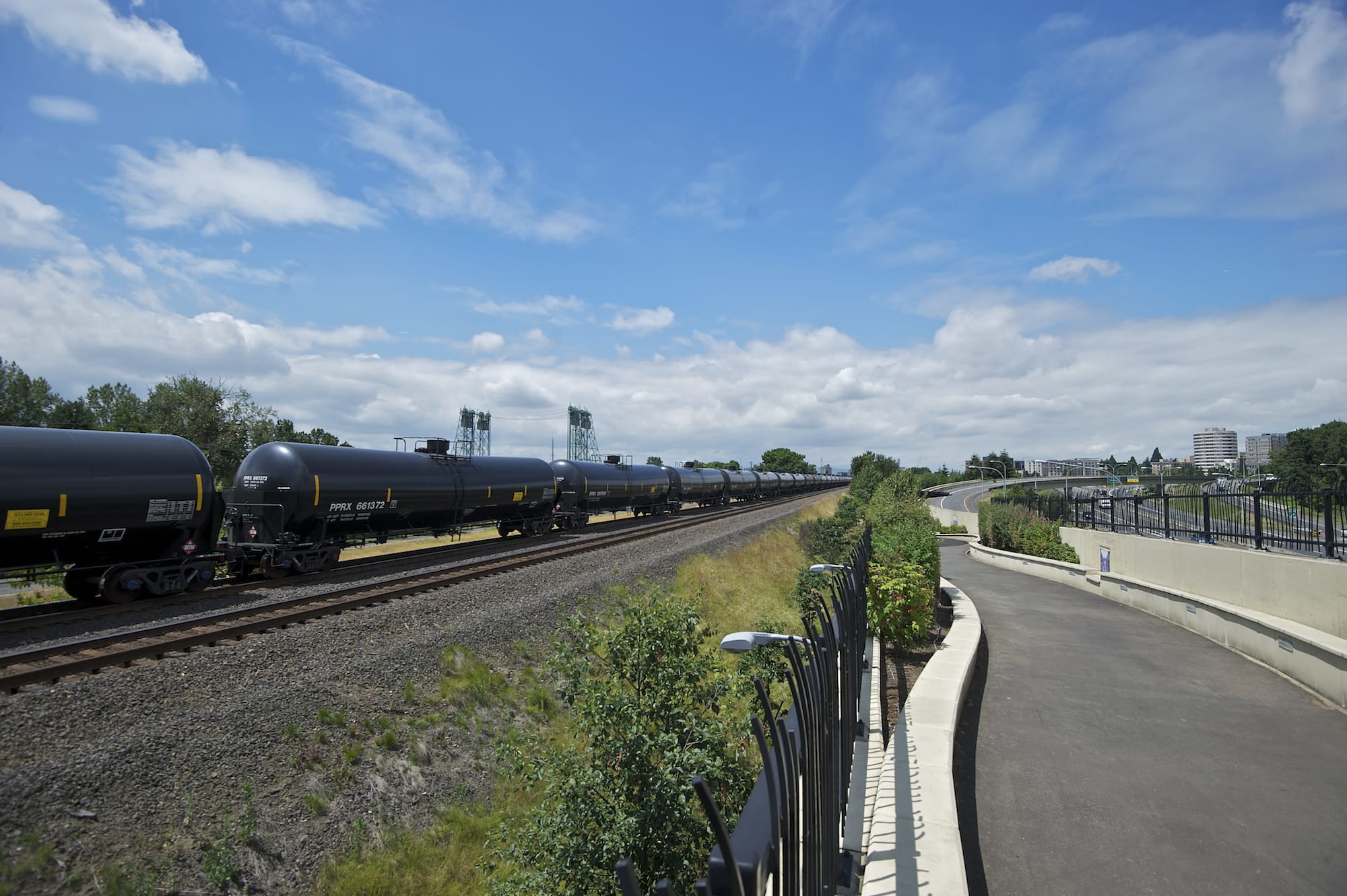Data released Tuesday show that 18 loaded BNSF oil trains can roll through Clark County in a single week — a figure shedding new light on a subject that railroads and regulators have been reluctant to discuss publicly.
BNSF Railway and Portland and Western Railroad were among the carriers that submitted reports to the Washington Military Department in response to a federal order. BNSF provided county-by-county train counts during a seven-day period, which tallied 18 crude oil trains in Clark County from May 29 through June 4.
In a separate report, Portland and Western cited three oil trains per week traveling from Vancouver into Oregon.
Railroads were ordered to file oil train data with states by the U.S. Department of Transportation last month as part of stepped-up safety protocols in response to a string of fiery train derailments. At the center of those concerns is so-called Bakken crude oil extracted mostly from North Dakota.
The transportation department issued the order, which took effect June 6, with the expectation that states would share the information, including routes, volumes and numbers of trains hauling 1 million or more gallons of Bakken crude, only with emergency response officials — not the public.
Aiming to make sure of that, BNSF and other railroads sent Washington and other states confidentiality agreements. Some states, including Washington, refused to sign them, saying they conflicted with their public disclosure laws. In Washington, officials proposed an alternative agreement under which the railroads would be allowed to seek a protective order in court to prevent the information from being released to the public.
Railroads have not sought such an order. As the Bakken oil train reports come in, Washington and other states are releasing them in response to public-disclosure requests filed by media, including The Columbian.
Courtney Wallace, a spokeswoman for BNSF, the largest hauler of crude oil by rail in North America, said Tuesday that the railroad received guidance from the U.S. Department of Transportation that the information wasn’t protected.
“Once it became clear from the federal government that crude oil was not considered sensitive, secure information, we continued on our path of simply complying” with the department’s emergency order, she said in an email.
The apparent about-face goes against BNSF’s June 6 report to Washington’s State Emergency Response Commission, repeatedly labeled “sensitive security information.” In a letter submitted with the report, BNSF hazardous materials director Patrick Brady implored the state to keep it secret.
“Although security regulations allow for limited disclosure of this information, we must all be cognizant that there is a real potential for the criminal misuse of this data in a way that could cause harm to your community or other communities along the rail route,” Brady wrote. “BNSF is providing this information to you with the understanding that your agency can and will protect such information from public disclosure.”
BNSF had previously only said it ran one to two Bakken oil trains daily in the Northwest. One of the railroad’s busiest lines goes through the Columbia River Gorge and Vancouver.
Worries about the safety of oil trains are particularly heightened in Vancouver, where Tesoro Corp. and Savage Cos. want to build an oil transfer facility at the Port of Vancouver. The proposed terminal would handle as much as 380,000 barrels of crude per day. The Tesoro-Savage project would be the largest such facility in the Northwest, and significantly increase the number of oil trains rolling through the county.
Several derailments of trains carrying crude oil from North Dakota’s Bakken region in the past year have raised concerns in cities and states across the continent. The spilled oil ignited massive fires in Canada, Alabama, North Dakota and Virginia, often surprising local mayors, fire chiefs and police chiefs, who were never told about the shipments.
Volumes ramp up
Oil trains have been on the radar of the Washington State Department of Ecology since 2012, said response manager David Byers. That’s when oil-by-rail volumes really ramped up in Washington and elsewhere because of the production boom in North Dakota.
“It’s been a great big deal for us for some time now,” Byers said.
The ecology department had seen the most recent oil train data shortly after it was submitted to the state, Byers said. Several agencies and jurisdictions have worked together to better understand a changing energy picture, he said, and the risks associated with it. But the number of trains carrying Bakken crude isn’t as important as the mere presence of it, he said.
“If there’s one train going through your county and you’re a first responder, you’re going to want to know that and be prepared for that,” Byers said.
One-week train counts in the state varied from five in Whatcom County to 19 in Klickitat County, according to the numbers reported by BNSF. Ten counties on the list saw no oil trains, according to the railroad.
At least some of the information that’s been shared by the states was already available from other sources, including the railroads themselves.
Tacoma for example, receives three trains of Bakken crude oil per week, each with 90 to 120 tank cars, according to a document released by state officials on Monday. It does not reveal what days or what times the cargo arrives, nor the route it takes.
A map on BNSF’s own website, though, identifies Tacoma as a destination for crude oil.
The McClatchy-Tribune news service contributed to this story.





